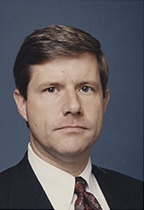
William Harrison Frist is an American physician, businessman, conservationist and policymaker who served as a United States Senator from Tennessee from 1995 to 2007. A member of the Republican Party, he also served as Senate Majority Leader from 2003 to 2007. Born in Nashville, Tennessee, Frist studied government and health care policy at Princeton University and earned a Doctor of Medicine degree from Harvard Medical School. He trained as a cardiothoracic transplant surgeon at Massachusetts General Hospital and Stanford University School of Medicine, and later founded the Vanderbilt Transplant Center. In 1994, he defeated incumbent Democratic Senator Jim Sasser.

Albert Arnold Gore Sr. was an American politician who served as a United States Senator from Tennessee from 1953 to 1971. A member of the Democratic Party, he previously served as a U.S. Representative from the state's 4th congressional district from 1939 to 1953. He was the father of Al Gore, who served as the 45th vice president of the United States from 1993 until 2001, and held Tennessee's other U.S. Senate seat from 1985 to 1993. A native of Granville, Tennessee, Gore graduated from Middle Tennessee State Teachers College and taught school. From 1932 to 1936 he was superintendent of schools for Smith County. He attended the Nashville Y.M.C.A. Night Law School, now the Nashville School of Law, from which he graduated in 1936.

John Jay Hooker, Jr. was an American attorney, entrepreneur, political gadfly and perennial candidate from Nashville, Tennessee, who was the Democratic nominee for Governor of Tennessee in 1970 and 1998.

James Hayes Shofner Cooper is an American lawyer, businessman, professor, and politician who served as the U.S. representative for Tennessee's 5th congressional district from 2003 to 2023. He is a Southern Democrat and was a member of the Blue Dog Coalition, and represented Tennessee's 4th congressional district from 1983 to 1995. His district included all of Nashville. He chaired the United States House Armed Services Subcommittee on Strategic Forces of the House Armed Services Committee, and sat on the Committee on Oversight and Reform, United States House Committee on the Budget, and the House Permanent Select Committee on Intelligence, more committees than any other member of Congress. At the end of his tenure, he was also the dean of Tennessee's congressional delegation. Cooper is the third-longest serving member of Congress ever from Tennessee, after Jimmy Quillen and B. Carroll Reece.

William Emerson Brock III was an American Republican politician who served in both chambers of the United States Congress from 1963 to 1977 and later in the United States Cabinet from 1981 to 1987. He was the grandson of William Emerson Brock Sr., a Democratic U.S. senator who represented Tennessee from 1929 to 1931.

William Vanderpool "Van" Hilleary is an American politician who served as the U.S. representative for Tennessee's 4th congressional district from 1995 to 2003. He is a member of the Republican Party.

The 1994 United States Senate elections were held November 8, 1994, with the 33 seats of Class 1 contested in regular elections. Special elections were also held to fill vacancies. The Republican Party took control of the Senate from the Democrats. Like for most other midterm elections, the opposition, this time being the Republicans, held the traditional advantage. The congressional Republicans campaigned against the early presidency of Bill Clinton, including his unsuccessful health care plan. Democrats held a 56-44 majority, after having lost a seat in Texas in a 1993 special election.
The 4th congressional district of Tennessee is a congressional district in southern Tennessee. It has been represented by Republican Scott DesJarlais since January 2011.

The 2006 congressional elections in Tennessee was held on November 7, 2006, to determine who will represent the state of Tennessee in the United States House of Representatives.

The Tennessee Democratic Party (TNDP) is the affiliate of the Democratic Party in Tennessee. The party was founded in 1826 initially as the Jacksonian Party. The Tennessee Democratic Party was born out of President Andrew Jackson's populist philosophy of Jacksonian democracy in the mid to late-1820s. After Jackson left office, the Democratic Party struggled in the state as the Whig Party would go on to be the dominate party in Tennessee until its collapse after the 1852 Election. Prior to the Civil War, as a result of the collapse of the former Whig Party, the Democratic Party became the dominate party in the state. After the war ended, the Republican Party would be the dominate political party during Reconstruction, but once Reconstruction ended, the Democratic Party would dominate Tennessee Politics up until 2011 when the Republican Party would gain firm control of Tennessee State Government.
John Bruce "Chip" Saltsman Jr. was an American politician who has served as chairman of the Tennessee Republican Party from 1999 to 2001, senior political advisor to former Senate Majority Leader Bill Frist, and manager of Mike Huckabee's 2008 presidential campaign. He also worked for the Chuck Fleischmann campaign in Tennessee's 3rd district from 2009 to 2010. Saltsman also worked for Randy Boyd's unsuccessful Tennessee Gubernatorial campaign in 2018.

The 1994 United States elections were held on November 8, 1994. The elections occurred in the middle of Democratic President Bill Clinton's first term in office, and elected the members of 104th United States Congress. The elections have been described as the "Republican Revolution" because the Republican Party captured unified control of Congress for the first time since 1952. Republicans picked up eight seats in the Senate and won a net of 54 seats in the House of Representatives. Republicans also picked up a net of ten governorships and took control of many state legislative chambers. This is the first midterm election since 1946 in which the Republicans ended unified Democratic control of Congress in a midterm election under a Democratic president.

The 1994 United States Senate election in Tennessee was held November 8, 1994. Incumbent Democratic U.S. Senator Jim Sasser ran for re-election to a fourth term but was defeated by Republican nominee Bill Frist.

The 1994 United States Senate special election in Tennessee was held November 8, 1994. Incumbent Democratic Senator Al Gore resigned from the Senate following his election as Vice President of the United States in 1992, and this led to the 1993 appointment of Harlan Mathews and the subsequent special election. Mathews did not seek election to finish the unexpired term, and Representative Jim Cooper subsequently became the Democratic nominee. However, the Republican nominee Fred Thompson won the seat in a decisive victory.

The 1988 United States election in Tennessee was held on November 8, 1988. Incumbent Democratic U.S. Senator Jim Sasser won re-election to a third term, defeating feating Republican nominee Bill Anderson with 65.1% of the vote.

The 1982 United States Senate election in Tennessee was held on November 2, 1982, concurrently with other elections to the United States Senate in other states as well as elections to the United States House of Representatives and various state and local elections. Incumbent Democratic U.S. Senator Jim Sasser won re-election. Sasser defeated Republican Robin Beard.

The 2014 United States Senate election in Tennessee took place on November 4, 2014, to elect a member of the United States Senate from the State of Tennessee. Incumbent Republican U.S. Senator Lamar Alexander defeated Democrat Gordon Ball, and was re-elected to a third term in office with 61.9% of the vote against 31.9%.

The 1988 United States presidential election in Tennessee took place on November 8, 1988. All 50 states and the District of Columbia were part of the 1988 United States presidential election. Tennessee voters chose 11 electors to the Electoral College, which selected the president and vice president. Tennessee was won by incumbent United States Vice President George H. W. Bush of Texas, who was running against Massachusetts Governor Michael Dukakis. Bush ran with Indiana Senator Dan Quayle as Vice President, and Dukakis ran with Texas Senator Lloyd Bentsen.

The 1976 United States Senate election in Tennessee took place on November 2, 1976. Incumbent Republican U.S. Senator Bill Brock ran for re-election to a second term but was defeated by Democratic challenger Jim Sasser.

The 1970 United States Senate election in Tennessee was held on November 3, 1970. Republican Bill Brock defeated Democratic incumbent Albert Gore, Sr. who ran for a fourth term. With Brock's victory, Republicans held both of Tennessee's U.S. Senate seats for the first time since Reconstruction in 1871. He was also the first Republican to hold this seat since 1875.











